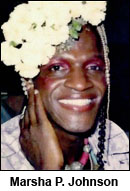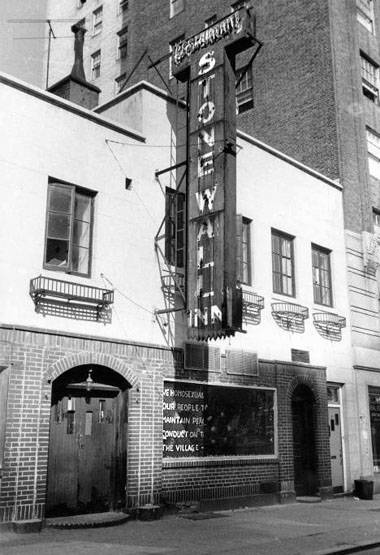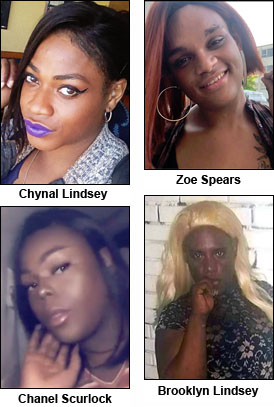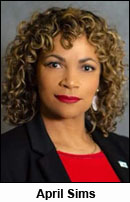OPINION
Solidarity with trans community honors LGBTQ Pride’s history
Our actions can transcend, counteract the violence that trans people face daily
By APRIL SIMS
 (June 28, 2019) — As we mark the culmination of Pride Month, we remember that Pride started as a riot, led by poor and working-class black and brown trans women like Marsha P. Johnson, who galvanized a burgeoning gay liberation movement.
(June 28, 2019) — As we mark the culmination of Pride Month, we remember that Pride started as a riot, led by poor and working-class black and brown trans women like Marsha P. Johnson, who galvanized a burgeoning gay liberation movement.
The Stonewall Riots began on June 28, 1969, born out of anger over the constant injustices that LGBTQ people suffered. Police, politicians, and community members enforced laws criminalizing same-sex relationships, using many of the tactics of intimidation and control that all working people recognize from our fight for worker power.
 LGBTQ people created underground spaces for themselves, often in bars where proprietors were willing to take their money, all in the face of surveillance, arrest, and imprisonment. The collective anger, demand for rights, and refusal to be ashamed that birthed six nights of the protests and confrontations with police that we know as the Stonewall Riots formed the basis of the LGBTQ civil rights movement in the U.S. and abroad.
LGBTQ people created underground spaces for themselves, often in bars where proprietors were willing to take their money, all in the face of surveillance, arrest, and imprisonment. The collective anger, demand for rights, and refusal to be ashamed that birthed six nights of the protests and confrontations with police that we know as the Stonewall Riots formed the basis of the LGBTQ civil rights movement in the U.S. and abroad.
Today marks the 50th anniversary of the Stonewall Riots. The LGBTQ rights movement has expanded the rights of many, and in Washington state, the lived experiences of LGBTQ individuals have shifted dramatically in those 50 years. But some members of the LGBTQ community have remained especially at-risk for violence and disregard for their rights.
For many of our trans brothers, sisters, and friends, the social strides we’ve made in marriage equality and medical rights don’t address what trans folks in the U.S. continue to face: an epidemic of violence, discrimination, and deprivation of rights.
Our cultural narrative of trans people is rife with alienating, inaccurate, and harmful messages. We all face daily challenges. Trans folks face those same challenges, but with the knowledge that they may be blocked from using a restroom, met with demeaning and hostile questions about their bodies, or become a target for violence and harassment.
Trans people are at a disproportionate risk for police violence, assault, murder, and suicide. According to the National Coalition of Anti-Violence Program’s 2013 Hate Violence Report, trans people of color, especially trans women, are at a disproportionate risk of police violence, and trans women of color make up more than half of all LGBTQ homicide victims.
 So far in 2019, advocates have tracked at least 11 transgender people who have been killed as a result of violence, according to the Human Rights Campaign. In the month of June alone, we know of four trans women that have been killed: Chynal Lindsey, Chanel Scurlock, Zoe Spears, and Brooklyn Lindsey, all young, black trans women.
So far in 2019, advocates have tracked at least 11 transgender people who have been killed as a result of violence, according to the Human Rights Campaign. In the month of June alone, we know of four trans women that have been killed: Chynal Lindsey, Chanel Scurlock, Zoe Spears, and Brooklyn Lindsey, all young, black trans women.
As we celebrate Pride, what actions can we take to honor the memory of these women, to counter the violence and discrimination that is killing other women like them?
There are so many things we can do to protect and uplift our trans brothers, sisters, and friends. In fact, I would argue that doing so is required by the guiding principles we hold as working people and as unionists. The preamble of the founding document of labor in Washington, the WSLC Constitution, makes clear our purpose:
“We shall combat resolutely the forces that seek to undermine the democratic institutions of our nation and to enslave the human soul. We shall strive always to win full respect for the dignity of the human individual whom our unions serve.”
As working people, we know the crushing weight of capitalism. We know what it means to feel that the powers in this world stand united against us. And we know how it feels to face those powers alone. But more importantly, we know how it feels to face power together. We know that standing together, having each other’s back, is how we fight the forces that seek to enslave the human soul.
Here at the WSLC, we’re working on tangible steps to show solidarity with our trans brothers, sisters, and friends. We’re focusing on asking folks for their pronouns at conferences, trainings, and meetings, seeking to normalize the notion that we can’t always tell someone’s gender by looking at them, and making it clear that we understand that opens space for folks to freely give their pronouns without seeming out of place. We’re prioritizing having gender-neutral bathrooms available at our events, and sharing resources with affiliates on why making space for trans and gender non-conforming people is so important — read more here.
As organized workers, we hold so much power when we act together. Standing on each other’s shoulders, we are a force to be reckoned with, and politicians and employers know this. Acting in solidarity with working people means living in solidarity with trans folks who are our coworkers, our neighbors, and our friends. Together, our actions can transcend and counteract the violence that trans people face daily.
There are many great organizations, local and national, that advocate for trans folks and trans rights. I encourage you to look into Gender Justice League and Lifelong in Washington, and the Trans Women of Color Collective nationally to learn more.
 April Sims is Secretary Treasurer of the Washington State Labor Council, AFL-CIO, representing the interests of more than 600 union organizations with approximately 550,000 rank-and-file members.
April Sims is Secretary Treasurer of the Washington State Labor Council, AFL-CIO, representing the interests of more than 600 union organizations with approximately 550,000 rank-and-file members.





